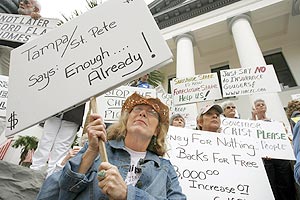By TOM
ZUCCO and JENNIFER LIBERTO TALLAHASSEE - A radical idea - to have the state of Florida assume much of the risk for massive hurricane damage - emerged on the first day of the special insurance session as one possible way to drive down skyrocketing premiums. A concept that would have been unthinkable just 10 months ago, the Florida Hurricane Excess Loss Program has been proposed by a cadre of senior senators and was the primary topic of discussion in the Senate throughout Tuesday.
The Senate Banking and Insurance Committee spent several hours Tuesday discussing FHELP. Proponents argue that the $40-billion cap is one that is not likely to be reached. Hurricane Katrina caused about $45-billion in insured losses in the entire Gulf Coast in 2005, and the 2004 Florida hurricane season, the worst in state history, caused about $23.5-billion in damages. The state, through its Florida Hurricane Catastrophe Fund, already covers excessive losses between $6-billion and $22-billion. FHELP would kick in for losses between $22-billion and $40-billion and the state would pay 90 percent of the damages with insurance companies paying the remaining 10 percent. The state would come up with the money through bonds, assessments or a portion of state sales tax. The theory is that if the private companies know their maximum potential losses, they can lower wind premiums by about a third, write more policies, or both. The weeklong special legislative session was called because the insurance market is in crisis. Premium rates have risen sharply and steadily in recent years and many companies have dropped policyholders. The state, through Citizens Property Insurance, already insures about a third of homes in Florida and is taking in new policies at a rate of about 60,000 a month. Still, the Senate proposal makes some in Tallahassee nervous. "How will we pay for that?" Sen. J.D. Alexander, R-Lakes Wales, asked twice during the discussion. Indeed, FHELP's fate is uncertain, largely because of the financial burden the state would face in the event of a catastrophic storm season. "Any time you talk about an idea that has the potential for dramatic liability on the shoulders of our taxpayers we're going to spend more than seven days talking about it," said House Speaker Marco Rubio. Even the House Democratic caucus hasn't decided if it will back the idea first floated by Senate Democrats. Minority Leader Dan Gelber dubbed it the "uber fund," and acknowledged the potential for premium savings if you "sort of hold your breath a little bit." State Farm, Florida's largest private property insurer, isn't taking sides on the issue yet. State Farm would like its liability capped from a corporate standpoint and told the Senate insurance committee that it could lead to 33 to 34 percent savings on wind-only residential policies, according to Mark Delegal, a lobbyist for State Farm. The Senate proposal is just one of many ideas lawmakers are considering this week. Others include:
Steve Burgess, who is serving his final week as the state's insurance consumer advocate, said he was encouraged by the "number of creative ways" lawmakers are looking at solving the crisis. As for the FHELP program, Burgess said that is a "social question, not an insurance question. Policymakers have to decide how much the state wants to get involved." Both House and Senate proposals may reach the chambers' floors as early as today. |
